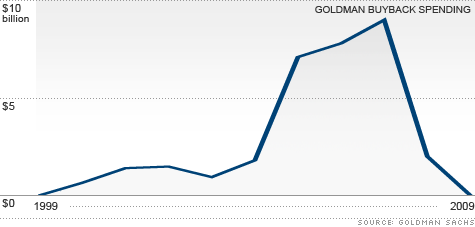Search News
 Goldman spent a hefty sum to buy back stock during the market boom, but the buybacks have come to a halt after the financial crisis.
Goldman spent a hefty sum to buy back stock during the market boom, but the buybacks have come to a halt after the financial crisis.NEW YORK (Fortune) -- Does anyone really believe a little populist outcry will make Goldman Sachs crawl under a rock?
The New York investment firm has come under attack as the backlash against bank bailouts builds. Long associated with uncanny trading profits, huge bonuses and political connections, Goldman (GS, Fortune 500) lately has become the face of Wall Street venality.
Not everyone buys into this logic, though. So with each plan to rein in the big banks, the market drumbeat grows for Goldman to take its ball and go home. The firm should relinquish its New York Stock Exchange listing and return to a partnership structure, according to one popular theory.
But as much as CEO Lloyd Blankfein might like to restore Goldman to a state of richly compensated obscurity, it is unlikely to flee the stock market. Doing so would hardly silence the firm's many critics and, more important, could hurt business.
"Going private doesn't solve their problems," said Roy C. Smith, a former Goldman partner who is now a finance professor at New York University. "It's not very practical on a number of levels, but especially because access to the public markets is essential for a trading firm."
Though it often claims otherwise, Goldman has indeed become a trading firm. Revenue from its trading and principal investments business accounted for 75% of total revenue in 2009, compared with an annual average of 39% in the second half of the 1990s.
But getting low-cost funds for trading isn't Goldman's only concern. Going private would force the firm to borrow tens of billions of dollars to buy out public shareholders -- a move that wouldn't jibe with the message that Goldman is being managed prudently and conservatively.
"For them to increase leverage at a time like this is not the way they typically do business," said David Merkel, chief economist at broker-dealer Finacorp Securities.
Goldman's bonuses figure in the mix too. The firm said before its 1999 initial public offering that selling stock to the public would create a highly liquid market for securities it could use to pay workers and make acquisitions.
Since then, paying workers seems to have taken even greater priority. The size of Goldman's staff has more than doubled in the decade since its IPO, while average pay per worker jumped to $498,000 in 2009 from $297,000 in 1998.
Like other banks, Goldman last year pledged to pay more in stock in the name of containing undue risk-taking. But it may run into problems because issuing all that stock comes at cost.
Goldman has spent $32 billion since its IPO buying back stock, in part to mop up the shares issued to employees. It hasn't always done so wisely. Merkel estimates the firm has squandered almost $6 billion over the past four-plus years buying back overpriced shares.
The firm hasn't bought back shares since early 2008, and chief financial officer David Viniar said last week on a conference call that he doesn't know when it will be able to decide about future buybacks.
"We are hopeful that over the course of this year, at least the broad outlines of regulatory programs will become a little bit more clear and we'll be in a better position to think about returning capital," Viniar said.
That uncertainty doesn't just keep Goldman from buying back shares. Though the administration recently has made a show of being tough on the financial industry, it remains unclear what rules the banks will operate under once financial reform legislation eventually passes Congress.
No firm will risk making major decisions until the ground rules are set on capital ratios, leverage, liquidity and windfall taxes, Smith said. And with the administration lately taking a much stronger stance, at least publicly, the haze seems in no great danger of clearing.
"The whole thing is pretty weird right now," Smith said. "We've gone from too big to fail to too hard to follow." ![]()






| Company | Price | Change | % Change |
|---|---|---|---|
| Ford Motor Co | 8.29 | 0.05 | 0.61% |
| Advanced Micro Devic... | 54.59 | 0.70 | 1.30% |
| Cisco Systems Inc | 47.49 | -2.44 | -4.89% |
| General Electric Co | 13.00 | -0.16 | -1.22% |
| Kraft Heinz Co | 27.84 | -2.20 | -7.32% |
| Index | Last | Change | % Change |
|---|---|---|---|
| Dow | 32,627.97 | -234.33 | -0.71% |
| Nasdaq | 13,215.24 | 99.07 | 0.76% |
| S&P 500 | 3,913.10 | -2.36 | -0.06% |
| Treasuries | 1.73 | 0.00 | 0.12% |
|
Bankrupt toy retailer tells bankruptcy court it is looking at possibly reviving the Toys 'R' Us and Babies 'R' Us brands. More |
Land O'Lakes CEO Beth Ford charts her career path, from her first job to becoming the first openly gay CEO at a Fortune 500 company in an interview with CNN's Boss Files. More |
Honda and General Motors are creating a new generation of fully autonomous vehicles. More |
In 1998, Ntsiki Biyela won a scholarship to study wine making. Now she's about to launch her own brand. More |
Whether you hedge inflation or look for a return that outpaces inflation, here's how to prepare. More |